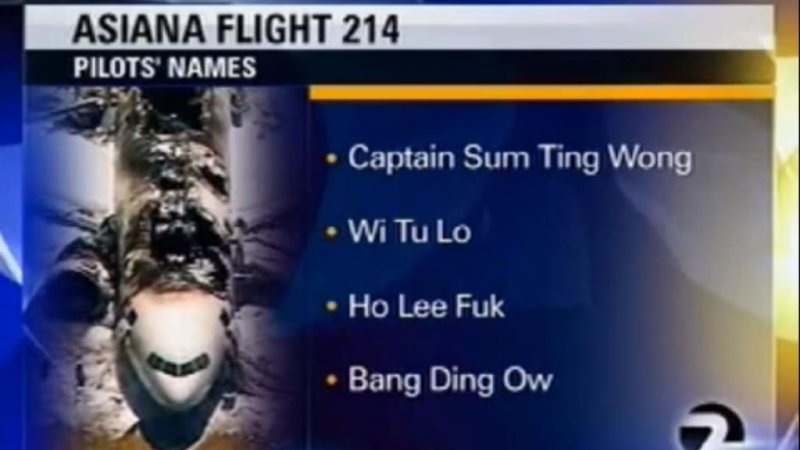San Jose news station KTVU aired a list of names they said belonged to the Asiana 214 flight crew, but the Asian stereotype names, including Captain Sum Ting Wong, were obviously fake. The station apologized for the mistake. (Screenshot via KTVU)
Asiana Airlines will sue the California television station that fell for a prank and mistakenly aired incorrect and offensive names for the pilots of the jet that crashed at San Francisco airport last week.
Oakland CNN-affiliate KTVU Friday aired four erroneous names after confirming the information with the National Transportation Safety Board.
While the airline initially said it would sue both KTVU and the NTSB for its "inaccurate and offensive" error, it announced Monday that it would not seek damages from the federal organization.
"After a legal review, the company decided to file a lawsuit against the network because it was their report that resulted in damaging the company's image," said airline spokesman Na Chul-hee.
The South Korean airline also said it had selected a U.S. law firm and planned to file a defamation petition soon in court.
The NTSB later admitted a summer intern had answered the call from the KTVU reporter and confirmed the names.
“Earlier today, in response to an inquiry from a media outlet, a summer intern acted outside the scope of his authority when he erroneously confirmed the names of the flight crew on the aircraft,” the NTSB said in a statement.
NTSB spokeswoman Kelly Nantel said the intern did not make up the names and did not provide them to the station, and reiterated that NTSB does not release or confirm the identities of people involved in transportation incidents.
KTVU apologized for the mistake both on-air and on its website.
"Nothing is more important to us than having the highest level of accuracy and integrity, and we are reviewing our procedures to ensure this type of error does not happen again," the statement said.
For the defamation suit to prevail, the airline would need to prove it had suffered damages to its reputation and that appropriate actions were not taken to prevent the mistake.







